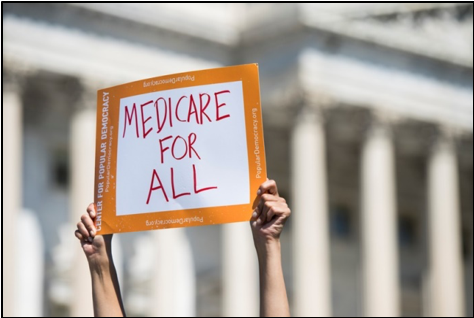
The Trump administration’s top Medicare official recently slammed the federal health program as riddled with problems that hinder care to beneficiaries, increase costs for taxpayers and escalate fraud and abuse.
Seema Verma, administrator of the Centers for Medicare & Medicaid Services (CMS), said those troubles underscore why she opposes calls by many Democrats for dramatically widening eligibility for Medicare, now serving 60 million seniors and people with disabilities, to tens of millions of other people.
“We only have to look at some of Medicare’s major problems to know it’s a bad idea,” Verma told Health Insurance Executives at a meeting in Washington.
CMS lacks the authority from Congress to operate the program effectively, Verma said, which means it often pays higher-than-necessary rates to doctors and hospitals and can’t take steps used by private insurers to control costs.
“We face tremendous barriers to supporting and bringing innovation to Medicare, and it literally takes an act of Congress to add new types of benefits for the Medicare population,” she added.
Since Medicare was approved in 1965, Congress has held power over eligibility and benefits — largely to control spending. That has meant efforts to expand services can get weighed down by partisan politics and swayed by lobbying groups, which significantly delay changes. One example: Congress didn’t add a pharmaceutical benefit to Medicare until 2003 — decades after drugs became a mainstay in most treatments.
Advocates for seniors have called for adding vision and dental benefits for many years, but the proposals have gotten little traction because of cost concerns.
Another problem, according to Verma, is that her agency reviews less than 0.2 percent of the more than 1 billion claims that Medicare receives from providers. “That is ridiculously low,” she said.
Verma also lamented the traditional Medicare program’s limited ability to require doctors and hospitals to get prior authorization from the federal government before performing certain procedures. That process — which has been routine for decades in the private sector — can lead to higher improper payments to doctors and more fraud and abuse, she said.
Jonathan Oberlander, a professor in the department of health policy and management at the University of North Carolina-Chapel Hill, agreed with Verma that “Medicare is not always nimble, particularly in adjusting benefits,” and officials have long complained that Congress micromanages the program. Still, he added, “with a program as large and important to Americans as Medicare, it is perfectly appropriate for Congress to weigh in on the addition of new benefits, especially since taxpayers will bear the costs of those changes.”
Verma for months has spoken out against the “Medicare-for-all” proposals pushed by Sen. Bernie Sanders (I-Vt.) and a growing chorus of Democrats. But her 35-minute address to the meeting of the trade group America’s Health Insurance Plans marked the first time she listed the litany of problems with Medicare, which she has run since March 2017.
Proponents of “Medicare-for-all” are reacting to problems caused by the Affordable Care Act, she said, and should know expanding Medicare will worsen the program’s existing challenges of controlling costs and improving care.
“But their solution is literally to do more of what’s not working,” she added. “It’s like the man who has a pounding headache, who then takes a hammer to his head to make it go away.”
Verma’s comments, however, overlooked the key leadership role that Medicare plays in the health sector, which is often emulated by private insurers, Oberlander said.
“In payment reform, Medicare has a record of being a leader and innovator,” he said. “For all of their supposed advantages, private insurers pay much higher prices than Medicare does for medical services. Verma ignores the fact that Medicare’s price regulation has produced substantial savings.”
Although Verma heavily criticized the traditional Medicare program, which covers two-thirds of enrollees, she boasted about how she and the Trump administration were running Medicare Advantage, the fast-growing alternative program that is operated by private insurers such as UnitedHealthcare, Aetna, and Humana.
More than 20 Million Medicare beneficiaries are enrolled in these plans, which often cost members less than traditional Medicare and have additional benefits. But they generally require members to use only the plan’s network of providers.
“Medicare Advantage represents value for our beneficiaries and taxpayers,” Verma said.
She touted a 2019 CMS initiative that will for the first time allow the Advantage plans to offer supplemental health benefits that go beyond traditional dental and health services. These include adult day care, in home support services and meals.
It is “one of the most significant changes made to the Medicare program” and “will have a major impact” on improving health for plan members, she said.
But the private plans have taken a cautious approach to adding those benefits.
About 270 Medicare Advantage Plans— or fewer than 10 percent of the total — have so far agreed to offer these services in 2019.
‘Greg Says’believes that before serious consideration is given to expanding the eligibility age for the Medicare program, much more needs to be done to reduce the waste, fraud, and abuse that currently amounts to more than $60B a year.
By Phil Galewitz, Kaiser Health News
October 16, 2018